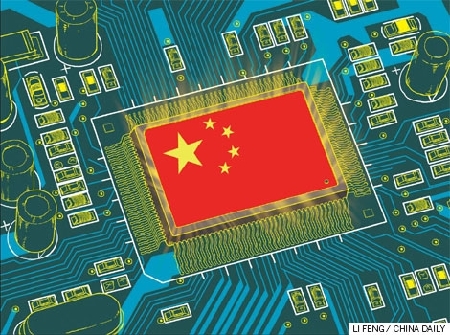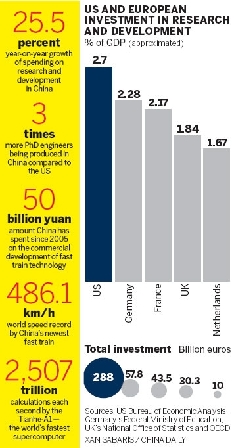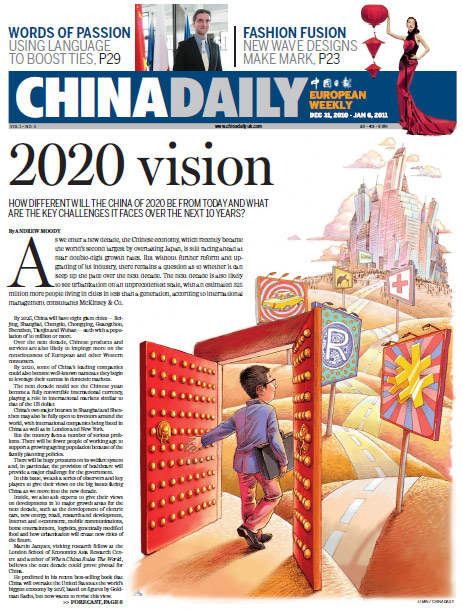Tech titan
Updated: 2010-12-10 10:31
By Andrew Moody, Yan Yiqi and Yang Yang (China Daily European Weekly)

China overtook the US as the world's largest investor in low-carbon energy, spending 25.9 billion euros last year, nearly double the US figure of 13.9 billion euros, according to the Pew Environment Group, the Philadelphia-based public policy body.
With 4G licenses set to be awarded in China in 2013, the country also aims to be at the forefront of mobile telephony.
In recent weeks, it have been superfast trains that have caught the public's imagination, not just in China but across the world.
Few other countries need fast rail links more than China with vast distances between major cities making air the only practical form of travel.
The prospect of trains which can travel as fast as helicopters is set to provide a major boost to the economy. The CRH380AL train, which set the record this month, is destined to slash the journey time between Beijing and Shanghai from 10 to four hours.
Since 2005, China has spent 50 billion yuan (5.64 billion euros) in the commercial development of fast train technology.
Wang Mengshu, professor at the Research Center of Tunnel and Underground Engineering at Beijing Jiaotong University and a member of the Chinese Academy of Engineering, believes China is now a global leader in this field.
"I believe China has the most advanced technology in the area of the high-speed railways," he says.
"There have been major technical obstacles in building the track, not least because of the huge temperature gap between the north and the south of the country, which means the materials have to meet the challenges of these extremes."
Niu Fengrui, director of the urban development and environmental research center at the Chinese Academy of Social Sciences, says fast railways were the answer to China's lack of an adequate domestic airport network.
"It is difficult to build an aviation network on the same scale as you can with high-speed rail and it will open up the country. It is also a greener alternative, reducing both energy usage and emissions."
Kurasawa Yasuki, a director at the Japan Overseas Rolling Stock Association, based in Tokyo, who was attending the 7th World Congress on High Speed Rail in Beijing this week, says China's advances in fast trains was not all down to Chinese technology.
"The development of fast rail is a very complex process. China's success in this area has been brought about not just through its own innovation but also from the technologies of other countries such as France, Germany and Japan."
If China is moving to any sort of leading position in technology, it has been a major catch-up exercise.
At the birth of modern China in 1949, there were just 50,000 people engaged in science and technology throughout the country.
Initiatives such as the launch of the China Academy of Sciences in the mid-1950s gradually began to build the scientific base, although the early focus was on satellite and nuclear technology.
But China now produces three times the number of PhD engineers than the US, according to the National Science Foundation, the independent US government agency.
The development of most technology in China is still with joint venture collaboration with European and other international parties.
The automotive industry is just one example, where Volkswagen has partnered First Automobile Works in Changchun in Jilin province since 1990.
But in the field of super computers China does seem to be stepping up a gear, mainly through its sole efforts.
The US and China now seem locked in a battle to have the fastest computer, although China is still reliant on the processing technology of US giants AMD and Intel.
Such computers have a wide range of applications from modeling climate change to automated financial trading to animated graphics and petroleum exploration.
Professor Arthur Trew, of Edinburgh University, who is responsible for the UK's HECToR supercomputer, admits China is beginning to leave Europe behind.
"The number of software engineers that China is turning out and putting into centers dwarfs anything we are doing in the West," he told The Guardian newspaper.
"I remember going to Shanghai and being astounded by the number of people they had - hundreds. Edinburgh is one of the largest centers in Europe and we have got 100."

Paper's Digest

Convertible yuan
The yuan is likely to be fully convertible and on the way to being one of the world's major currencies by 2020.
Fight against inflation
Words of passion
Euro vision
Specials

Internet aids luxury sales
More sophisticated Chinese consumers are surfing for luxury products on the Internet and a number of branded labels are ready to ride the wave.

Tobacco controls
An anti-smoking watchdog has criticized Chinese authorities for "making little progress" on enforcing tobacco controls.

Godfather of yachts
Traugott Kaminski claims he was the first person to bring the yacht culture to China seven years ago.
